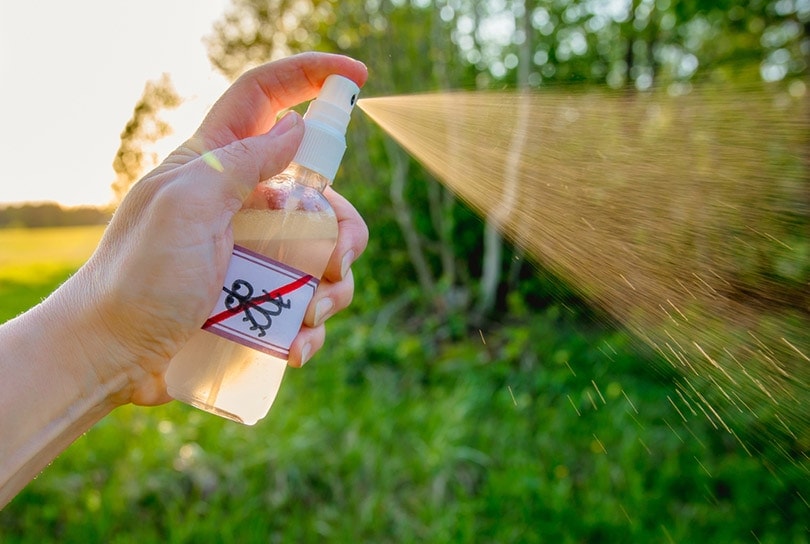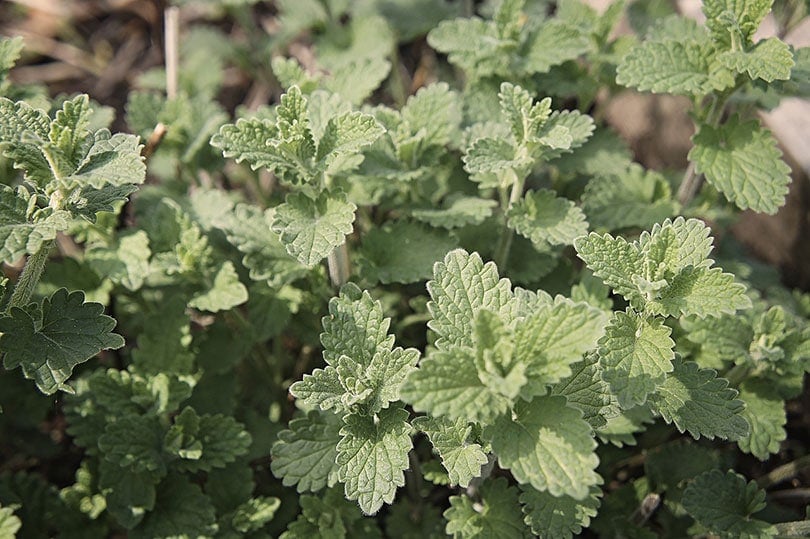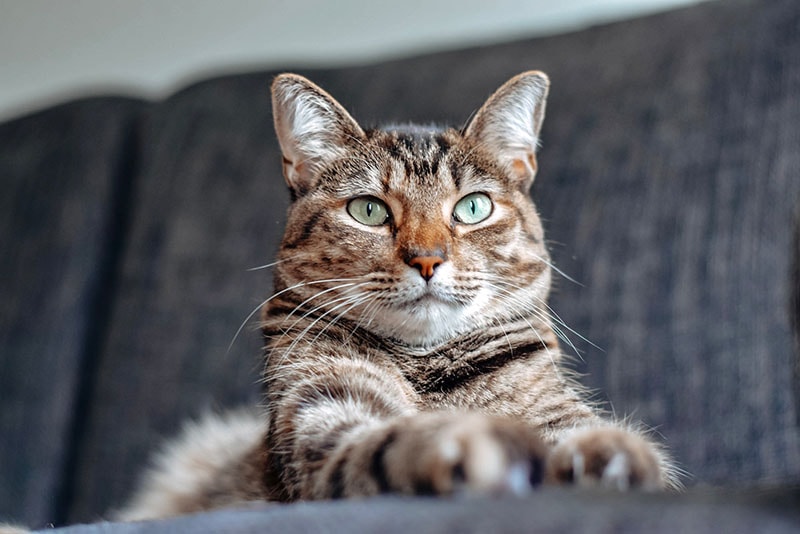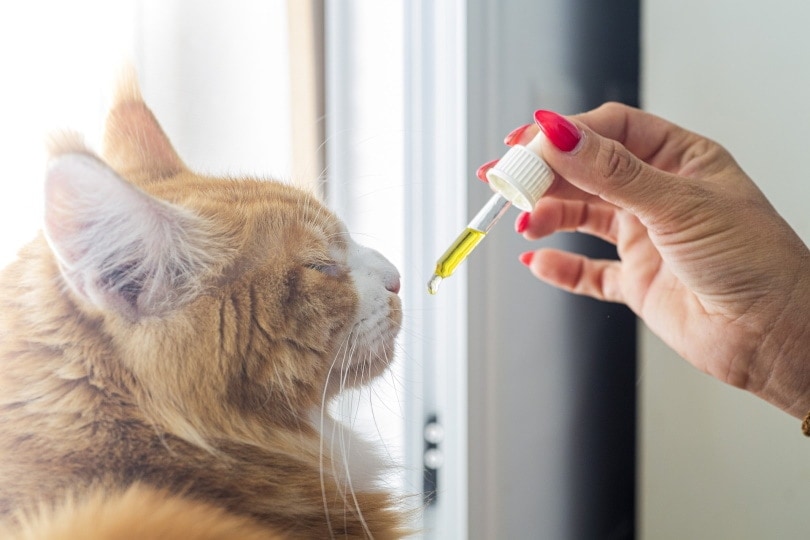How to Make Homemade Mosquito Repellent for Cats: Vet-Appoved Ingredients
Updated on

Mosquitoes bother us humans, mainly in the warmer months, but they can be a nuisance for our cats, too. Not only do they annoy them with their bite, but they can also cause secondary skin infections if they continue to scratch the affected areas. More seriously, mosquitoes can be carriers of a disease known as heartworm disease. Prevention prescribed by your veterinarian is the only way to protect your feline friend from heartworm disease, so make sure to discuss available options with your vet.
We do want to add that control of the mosquito population is the best way to keep them away from you and your cats. But if you’re combating swarms of bugs this summer, you may want to also consider homemade mosquito repellents. These are not to replace products your veterinarian may prescribe but may be used as a supplement under your veterinarian’s direction.
First, A Warning!
Before we jump in, we would like to make a few warnings clear. Firstly, you should never use commercial products meant for humans on your cat. Many repellent sprays contain the insecticide DEET, and cats are highly sensitive to this ingredient (just like bugs). If you use DEET on your feline, it can lead to neurologic problems, like tremors and seizures. In extreme cases, it can even lead to death.
You should also not use essential oils unless you have researched them thoroughly and consulted with your veterinarian. Many essential oils are not safe for cats, especially in the amounts that you would use for insect repellent. Essential oils can cause respiratory issues, central nervous system depression, and even liver damage. For instance, tea tree oil is particularly toxic.
Citronella is also very toxic to cats and should not be used on or around them. It is commonly found in some insect repellents, so be on the lookout for products that contain this ingredient. Read on for ideas on homemade mosquito repellents.
The 5 Ingredients for DIY Cat Mosquito Repellent
1. Citrus Juice

Mosquitoes dislike the smell of citrus juice—it’s simply too strong, and in fact, many cats dislike it too. You can use citrus as an easy mosquito repellent. Simply combine the juice from six lemons into a quart of water. Then, let the ingredients boil to allow some of the water to evaporate, and let it sit for about an hour.
Once it has cooled, put it in a spray bottle and try spraying a few areas on your cat first to see how well they tolerate the smell. Their noses can be quite sensitive! This natural spray should work fairly well (if they are ok with the smell) and is pretty easy to make.
2. Catnip

Many cats are naturally attracted to catnip, but mosquitos do not like the smell of catnip at all. In fact, there are some theories that a cat’s attraction to catnip evolved because it keeps away bugs. Therefore, an easy way to keep the mosquitoes away from your feline is to use catnip. Not only may it be helpful, but your cat might like this method over the others!
There are several ways you can go about applying catnip to your felines. One method is to simply have catnip nearby so that your cat can rub up against it as they feel the need. You can also rub the plant directly onto your feline’s skin after you’ve broken it up a bit to release the oils.
You can also make a spray mixture with the plant and then spray it onto your cat as necessary. It would work very similarly to a bug spray.
However, crafting a spray can be time-consuming and a bit smelly. If you have cats indoors, this may not be the best option. It may overwhelm their senses.
For this method to be effective, you’ll need to reapply it every thirty minutes or so. It’s not like formulas containing DEET, which are effective for a few hours.
3. Yarrow

Yarrow flowers seem to be just as effective as catnip, and you can use them in a similar manner. Either rub the flowers directly onto your cat, keep yarrow plants close by so that your cat rubs up against them, or create a homemade spray.
Similar to catnip, yarrow only works for about thirty minutes or so and needs to be reapplied often for maximum effectiveness.
4. Lemon Eucalyptus

Studies have shown that lemon eucalyptus oil can be effective in repelling mosquitoes. Specifically, studies found that lemon eucalyptus oil provides two hours of protection, which is just a bit more than DEET. This oil is even approved for use in heavily infested areas where the West Nile Virus is located. Therefore, it is probably one of the most effective options on this list!
It’s typically safe for cats. There are some commercial versions of the product available online, and you may be able to find them at your local pet store, too. If searching online, use reputable pet companies to purchase your products from. It’s best to apply the oil to the outside of your cat’s collar to keep it off of their skin. Periodically wash the collar to prevent oil buildup. Speak with your veterinarian first before using any commercial products on your cat.
5. Vinegar

Vinegar has long been used as a repellent against mosquitoes. You can mix a small amount in water (try 1:6 parts) and apply a little in a few places on the outside of your cat’s collar. Since most cats may find the smell offensive, and it may cause skin irritation if not diluted enough, this may not be the first choice in mosquito repellents.
Conclusion
Most commercial bug sprays for people are completely incompatible with cats and should be completely avoided if they contain DEET, citronella, or any other ingredients known to be toxic to cats. Homemade repellents may be helpful in keeping mosquitoes away from your kitty but are not a replacement for control in the environment or anything your veterinarian may prescribe. So make sure to have an open discussion with your vet if you are experiencing a mosquito takeover.
Featured Image Credit: FotoHelin, Shutterstock












